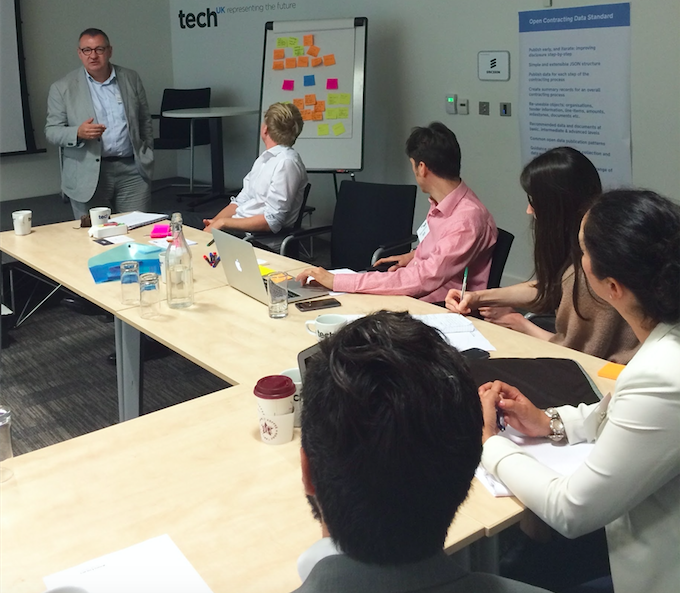I recently blogged about how government is supporting open data standards in public procurement and contracting and what we’re doing to move towards an open standard for public procurement and contracting data.
I suggested that the quality and amount of data around government contracts could be improved by implementing the Open Contracting Data Standard (OCDS). I published this suggestion as a ‘challenge’ on the Standards Hub where a panel of technology and data experts in government reviewed and offered their feedback.
The next stage in the Standards Hub process is the ‘response stage’ where we ask potential users and OCDS implementers from inside and outside government to comment. Last week, to gather their feedback, we hosted a workshop with techUK to find out what they think about the OCDS as an answer to this data problem.
Overview and introductions to open contracting
We began with an introduction to open contracting, covering:
- the work we’re doing in the Digital Marketplace to improve and open up procurement and contract data
- the origins of OCDS and the work of the Open Contracting Partnership
- what the Crown Commercial Service (CCS) is doing to implement the OCDS, one of the open contracting commitments made in the UK’s Open Government Partnership National Action Plan
We asked attendees to work in pairs and capture what they thought the opportunities and challenges of implementing OCDS would be. We also asked what they thought of opening up public sector procurement and contracting generally.
The group discussed the opportunities that will follow when we’ve implemented the standard and we've grouped the feedback into themes.
Transforming the relationship between citizen and state by:
- meeting user needs by working together, increasing engagement and collaboration, building trust between government and civil society
- making data and contracts more accessible to businesses and the public throughout the duration of contracts
- helping government to become more transparent about how it’s spending taxpayer money
Opening up government markets by:
- stimulating innovation to support delivery of better public services
- greater transparency within and across supply chains
- linking government’s grant data and spend data so any connection between the 2 is more transparent
Improving efficiency, effectiveness and value for money by:
- making it easier for suppliers and service providers eg voluntary, community and social enterprise (VCSE) organisations to do business with government, and with each other
- lowering costs for suppliers as well as government buyers
- saving time and money
The group also discussed the challenges we’ll face when we implement the Open Contracting Data Standard. We grouped this feedback into themes too.
Behavioural, cultural and technical change might be challenging because:
- open contracting doesn’t necessarily mean open spending
- there’s a common perception that the rules around things like confidentiality, security, intellectual property rights (IPR) can’t be changed
- government might not have the knowledge, skills and capabilities
- the legislative and political environment might make it more difficult to change things
- at the moment, procurement and contracting practices makes it difficult to link opportunities for work with the company that wins the work
- at the moment it’s not easy to provide good quality information consistently to support better procurement and contracting data
The complexity of government might make it difficult to implement the OCDS because:
- procurement and contracting data comes from lots of different places eg global and national suppliers and their supply chains as well as, local suppliers, departments and agencies who may have centralised or decentralised organisational structures
- the relationship between policy, practice, data and systems is often disjointed
It might be difficult to improve the quality and simplicity of contracts and data because:
- there’s little guidance for public sector organisations on how provide relevant and meaningful information to support quality data
- government contracts are complicated and contain complex language
- the way that data is organised and maintained is currently a challenge as we don’t have canonical data sets eg of suppliers
- there may be dependencies on other standards, eg addresses
The next stage
Everyone can have their say by logging in to the Standards Hub and leaving a comment before the response stage ends on 14 July. After this, the Standards Hub will incorporate these comments and publish a ‘proposal’. This proposal will be open for further comment from hub users for 4 weeks before the panel evaluates it.
As always, we’ll be thinking out loud by blogging here regularly. Sign up to the Digital Marketplace blog to keep up to date with our progress.
